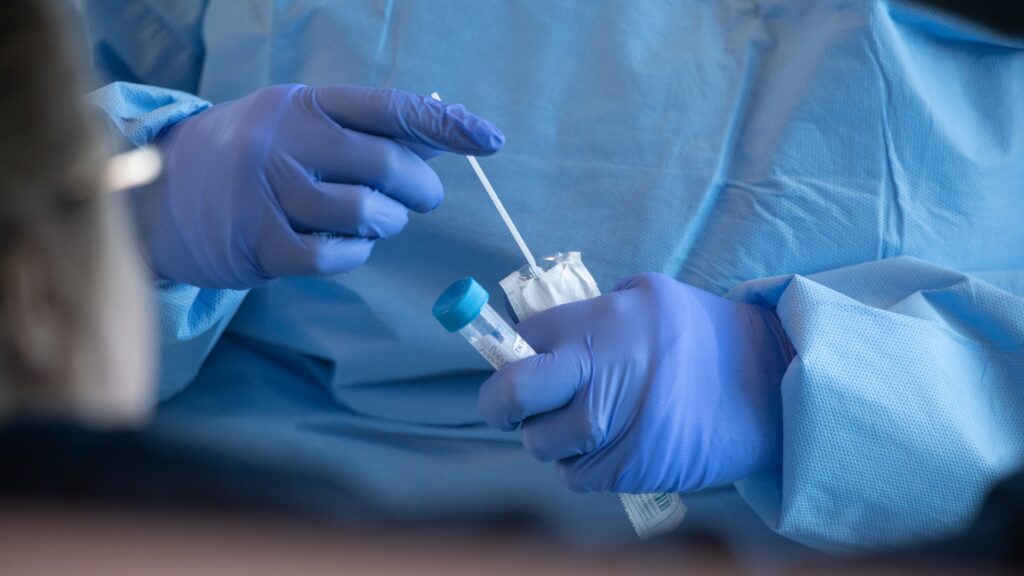
OHSWEKEN — The Delta variant of the COVID-19 virus has been identified on Six Nations, and is spreading rapidly.
The latest data reported on Tuesday said 13 the 36 active COVID-19 cases were confirmed to be the Delta variant. A staggering 122 people are now in self-isolation. One person is in hospital.
TRT requested additional information from Six Nations of the Grand River Elected Council about the new cases, including if any of those are confirmed to be breakthrough infections in residents who have been vaccinated. As of press time there was no response to those questions.
Elected Council has met to discuss the implications of the Delta variant on Six Nations and will be re-evaluating the community’s colour-coded COVID alert level this week, said SNGR communications officer Katie Montour.
After a relatively COVID-free summer, as of Tuesday evening Six Nations was still in alert level green, the lowest alert level in the system with the least amount of restrictions. This despite the community having 211 cases per 100,000 — a rate that is eight times the infection rate of Toronto Public Health and nearly seven times the infection rate of Brantford-Brant.
To date, eleven Six Nations residents have died of COVID-19 since the World Health Organization declared the pandemic in March 2020.
The black alert level is the highest alert level, with almost every business or building closed down on the reserve but essential services, but it is still unclear if SNGR will change the alert level to match the current outbreak and why a shift to increase the alert level has not happened despite the local infection rate topping the provincial data.
The Delta variant is the dominant strain currently circulating the globe, and is the driving force behind the current “fourth wave” of COVID infections worldwide, according to the Centers for Disease Control.
SNGR confirmed the six cases of Delta on Aug. 31, and 18 active cases of COVID-19 on Sept. 1. A total of 27 new cases have been confirmed in the last seven days.
SNGR says the Delta variant, “is more contagious than previous variants of the virus and can cause more severe illness and hospitalization, specifically in those who are unvaccinated.”
According to the Six Nations COVID-19 website vaccination rates are much lower than the provincial rate. Just 42% have reported getting at least one vaccine and 38% have reported getting both vaccines. In Ontario nearly 74% of residents have received at least one dose and nearly 68% are fully vaccinated. However it is unclear if the Six Nations vaccination data is reflecting band membership or Six Nations residents that are vaccinated. SNGR previously put out a call for band members, regardless of residency, to report their vaccination status to Ohsweken Public Health. TRT sought clarification on local vaccination rates of residents compared to band membership and did not receive a response by press time.
Meanwhile, the province has taken action to implement vaccine certifications that will allow residents who are fully vaccinated to participate in public life and prohibit non-vaccinated persons from specific settings. TRT also sought clarification from SNGR if the provincial passports will be in effect on the territory, how and if SNGR will implement vaccine passports in the community. There was no response to those questions by press time.
Six Nations students just returned to school yesterday for the first time since the pandemic was declared in March 2020, resulting in community-wide shut downs of businesses and organizations.
Since then, Six Nations schools have instituted extensive COVID-19 safety and prevention measures, mainly, staggered class sizes, with students alternating days to reduce the number of kids in class to allow for physical distancing.
In the meantime, SNGR is encouraging community to get vaccinated against COVID-19 and is urging anyone experiencing flu-like symptoms to get tested.
Six Nations Public Health says the recent spike in cases is a result of people “letting their guard down at a time when we must remain diligent in following public health measures in order to decrease incidence.”








